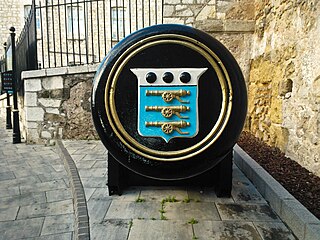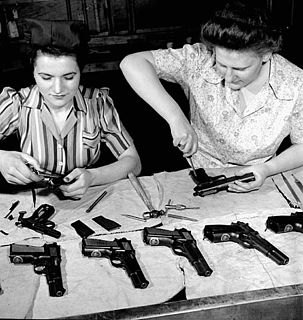
The Birmingham Small Arms Company Limited (BSA) was a major British industrial combine, a group of businesses manufacturing military and sporting firearms; bicycles; motorcycles; cars; buses and bodies; steel; iron castings; hand, power, and machine tools; coal cleaning and handling plants; sintered metals; and hard chrome process.

The Board of Ordnance was a British government body. Established in the Tudor period, it had its headquarters in the Tower of London. Its primary responsibilities were 'to act as custodian of the lands, depots and forts required for the defence of the realm and its overseas possessions, and as the supplier of munitions and equipment to both the Army and the Navy'. The Board also maintained and directed the Artillery and Engineer corps, which it founded in the 18th century. By the 19th century, the Board of Ordnance was second in size only to HM Treasury among government departments. The Board lasted until 1855, at which point it was disbanded.

The Royal Arsenal, Woolwich is an establishment on the south bank of the River Thames in Woolwich in south-east London, England, that was used for the manufacture of armaments and ammunition, proofing, and explosives research for the British armed forces. It was originally known as the Woolwich Warren, having begun on land previously used as a domestic warren in the grounds of a Tudor house, Tower Place. Much of the initial history of the site is linked with that of the Office of Ordnance, which purchased the Warren in the late 17th century in order to expand an earlier base at Gun Wharf in Woolwich Dockyard.

The arms industry, also known as the arms trade, is a global industry which manufactures and sells weapons and military technology. It consists of a commercial industry involved in the research and development, engineering, production, and servicing of military material, equipment, and facilities. Arms-producing companies, also referred to as arms dealers, or as the military industry, produce arms for the armed forces of states and for civilians. Departments of government also operate in the arms industry, buying and selling weapons, munitions and other military items. An arsenal is a place where arms and ammunition - whether privately or publicly owned - are made, maintained and repaired, stored, or issued, in any combination. Products of the arms industry include guns, artillery, ammunition, missiles, military aircraft, military vehicles, ships, electronic systems, night-vision devices, holographic weapon sights, laser rangefinders, laser sights, hand grenades, landmines and more. The arms industry also provides other logistical and operational support.
Rheinmetall AG is a German automotive and arms manufacturer, headquartered in Düsseldorf, Germany. Its shares are traded on the Frankfurt stock exchange.

Stockholm International Peace Research Institute (SIPRI) is an international institute based in Stockholm. It was founded in 1966 and provides data, analysis and recommendations for armed conflict, military expenditure and arms trade as well as disarmament and arms control. The research is based on open sources and is directed to decision-makers, researchers, media and the interested public.

The economy of India is a middle income developing market economy. It is the world's sixth-largest economy by nominal GDP and the third-largest by purchasing power parity (PPP). According to the International Monetary Fund (IMF), on a per capita income basis, India ranked 145th by GDP (nominal) and 122th by GDP (PPP). From independence in 1947 until 1991, successive governments promoted protectionist economic policies, with extensive state intervention and economic regulation. This is characterised as dirigism, in the form of the License Raj. The end of the Cold War and an acute balance of payments crisis in 1991 led to the adoption of a broad economic liberalisation in India. Since the start of the 21st century, annual average GDP growth has been 6% to 7%, and from 2013 to 2018, India was the world's fastest growing major economy, surpassing China. Historically, India was the largest economy in the world for most of the two millennia from the 1st until the 19th century.

Armscor, the Armaments Corporation of South Africa is the arms procurement agency of the South African Department of Defence. It was originally established in 1968 as an arms production company, primarily as a response to the international sanctions by the United Nations against South Africa due to apartheid which began in 1963 and were formalised in 1977.
Historically, an armourer is a person who makes personal armour, especially plate armour. In modern terms, an armourer is a member of a military or police force who works in an armoury and maintains and repairs small arms and weapons systems, with some duties resembling those of a civilian gunsmith. There is increasing evidence that companies specializing in the manufacture of armoured vehicles or applique armour for application onto vehicles of all types are referring to themselves as armourers; such as the UK company OVIK Crossway - which describes its services as Armourers and Coach Builders. In some ways, this is a reversion back to the original meaning of the term insofar as these companies forge, adapt or integrate physical armour onto platforms in order to protect human life.

The Licence Raj or Permit Raj was the system of licences, regulations, and accompanying red tape, that hindered the set up and running of businesses in India between 1947 and 1990. Up to 80 government agencies had to be satisfied before private companies could produce something and, if granted, the government would regulate production. The term is a play on the "British Raj", which refers to the period of British rule in India. It was coined by Indian independence activist and statesman Chakravarti Rajagopalachari, who firmly opposed it for its potential for political corruption and economic stagnation, founding the Swatantra Party to oppose these practices.
Royal Ordnance Factories (ROFs) was the collective name of the UK government's munitions factories during and after the Second World War. Until privatisation, in 1987, they were the responsibility of the Ministry of Supply, and later the Ministry of Defence.

Britishre-armament was a period in British history, between 1934 and 1939, when a substantial programme of re-arming the United Kingdom was undertaken. Re-armament was necessary, because defence spending had gone down from £766 million in 1919–20, to £189 million in 1921–22, to £102 million in 1932.
The Sterling SAR-87 is a military assault rifle of the late 20th century. The Sterling Assault Rifle (SAR), which included elements from Sterling's earlier Light Automatic Rifle (LAR) design, was jointly engineered by Sterling Armaments Company and Chartered Industries of Singapore in the early 1980s as an advanced version of the AR-18 for the export sales.

The Great Depression in India was a period of economic depression in the Indian subcontinent, then under British colonial rule. Beginning in 1929 in the United States, the Great Depression soon began to spread to countries around the globe. A global financial crisis, combined with protectionist policies adopted by the colonial government resulted in a rapid increase in the price of commodities in British India. During the period 1929–1937, exports and imports in India fell drastically, crippling seaborne international trade in the region; the Indian railway and agricultural sectors were the most affected by the depression. Discontent from farmers resulted in riots and rebellions against colonial rule, while increasing Indian nationalism led to the Salt Satyagraha of 1930, in which Mahatma Gandhi undertook marches to the sea in order to protest against the British salt tax.
Royal Ordnance plc was formed on 2 January 1985 as a public corporation, owning the majority of what until then were the remaining United Kingdom government-owned Royal Ordnance Factories which manufactured explosives, ammunition, small arms including the Lee–Enfield rifle, guns and military vehicles such as tanks. It owned some 16 factories; and employed about 19,000 staff.

Dame Rachel Eleanor Crowdy, DBE was an English nurse and social reformer. She was Principal Commandant of Voluntary Aid Detachments in France and Belgium from 1914 to 1919 and Chief of the Department of Opium Traffic and Social Issues Section of the League of Nations from 1919 to 1931. She was also an active member of the British National Committee for the Suppression of the White Slave Trade.
Merchants of death was an epithet used in the U.S. in the 1930s to attack industries and banks that had supplied and funded World War I.

Col. David Carnegie, was a British scientist, engineer and Liberal Party politician who worked for the Canadian government.
Sir John Eldon Bankes was an English judge who worked in the Court of Appeal from 1915 to 1927.

The defence industry of Australia provides military equipment, supplies and services for the Australian Defence Force (ADF) and export customers. Definitions of what the defence industry comprises and estimates of its size differ, but it was believed to have employed between 12,000 and 29,000 people as of the mid 2010s. The industry has grown over recent years, and Australian Defence Magazine reported that the 40 largest companies had a total revenue of $A 9.2 billion in 2015.